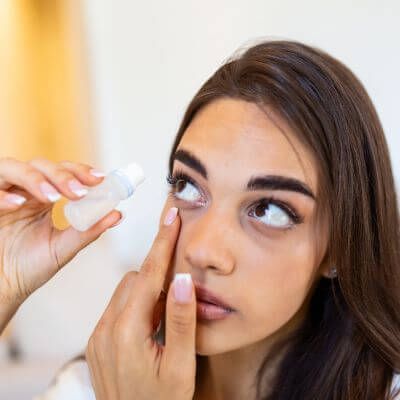Fireworks and Eye Safety – Safety Tips for the 4th of July
While fireworks and Independence Day are a classic pair, you should still exercise caution when combining them. According to a recent report from the U.S. Consumer Product Safety Commission (CPSC), almost two-thirds of emergency room visits due to fireworks occurred between mid-June and mid-July of 2018.
Fireworks and eye safety are a huge concern at any time of year, but especially before and after the 4th of July. You need to know the risks fireworks pose to your eyes and vision, how to handle fireworks responsibly, and what to do if a fireworks-related injury were to occur.
To help you be prepared, we’ll look at:
- Fireworks and health
- Safety tips for handling fireworks
- What to do if your eyes are injured by fireworks
Fireworks can prove a huge hazard to your vision as well as your overall health. Fortunately, fireworks-related injuries to your eyes and other parts of your body are easily avoided with the right knowledge and precautions.
Fireworks and Health
According to the CPSC report, emergency rooms reported an estimated 9,100 injuries caused by fireworks in 2018. Of those 9,100 fireworks-related injuries, they estimate that 5,600 injuries occurred between June 22 and July 22. That’s 62% of all injuries caused by fireworks occurring in the span of a month!
Very few deaths occurred from fireworks-related injuries in 2018 – only 5. 19% of those cases were ocular injuries. While eye injuries may not be life-threatening, they can still result in a lot of pain and have the potential to greatly reduce your quality of life.
The worst injuries caused by fireworks can result in:
- The rupturing of your eyeball
- Thermal burns
- Chemical burns
- Corneal abrasions
- Retinal detachment
Conditions like retinal detachment can occur naturally as we age. Usually, it’s the result of the vitreous (the clear gel in the middle of the eye) shrinking or pulling away from the center of your eye. This eventually results in the tearing and eventual detachment of your retina. Without surgery, you run the risk of losing eye function and becoming blind.
However, in the case of eye injuries caused by fireworks, this condition can occur at a much younger age and impact the rest of your life, or the lives of your children.
Safety Tips for Handling Fireworks
Fortunately, serious eye injuries from fireworks are easily avoidable . The best way to avoid them is to never handle them at all and leave it to the professionals. Public fireworks shows are a great way to enjoy the spectacle of Independence Day from the safety of a park, your car, or even your living room.
Keep in mind that there are still safety concerns if you attend a live fireworks show. Don’t cross any boundaries that you’re restricted from entering. These areas are for professionals and have been sealed off for your safety.
You should also make sure not to touch any fireworks if you happen to stumble across them, even if they haven’t been set off. Instead, alert one of the event staff or someone from your local fire or police department. They’ll remove the unexploded fireworks from the area and dispose of them safely.
Fireworks and Eye Safety at Home
The dangers of fireworks are a lot more apparent at home. Roman candles and other projectile-styled fireworks pose an obvious threat of a firework spark in the eye. However, even fireworks that seem safe pose a serious threat to the safety of you and your family.
Take sparklers, for instance. According to the report from the CPSC, sparklers were the cause of 1,200 fireworks-related injuries in 2018. With a temperature that can reach over 2,000 degrees Fahrenheit, it’s extremely important to exercise caution and always supervise children when using them.
To use consumer fireworks safely, always make sure that you:
- Prevent young children from playing with them.
- Only let older children use them under close supervision.
- Choose a clear area for setting them off.
- Don’t attempt to relight malfunctioning fireworks.
- Have a bucket of water handy to soak malfunctioning fireworks in.
- Wait for other people to be out of range before lighting them.
- Observe local laws and regulations when lighting fireworks, if they’re allowed.
You don’t have to live in fear of fireworks. You can have plenty of fun this summer as long as you exercise caution and practice safe handling procedures.
What to Do If Your Eyes Are Injured by Fireworks
As we’ve already shown, serious injuries from fireworks can lead to severe damage and even blindness. Thankfully, safety precautions are easy to follow if you are using fireworks at home.
But accidents do still happen. Eye injuries from fireworks can be a fusion of heat burns, blunt force trauma, and chemical exposure. That’s why you should treat all injuries from fireworks as medical emergencies and seek immediate medical attention. There are also certain things you should not do or you may make the injury worse.
If you experience an eye injury from fireworks, don’t :
- Rub your eyes.
- Rinse the wound.
- Apply pressure to the wound.
- Remove any debris from the wound.
- Use any ointments painkillers that can thin your blood, like ibuprofen or aspirin.
No one plans on having to go to the emergency room for a firecracker injury. However, you should always have a plan and know what to do if the situation were to happen.
Fireworks are a time-honored way to celebrate the 4th of July. With that said, they also pose a clear danger to our ocular and overall health. Exercise caution when using them and provide plenty of supervision for older children that are using them. We hope that you never have to use it, but always have a plan in place if an emergency were to occur.
Baptist Eye Surgeons is an ophthalmological practice in Knoxville, TN, and Morristown, TN. Visit our website to meet our doctors and learn more about our specialties, or give us a call at 865-579-3920 for more information or to schedule an appointment .


MORRISTOWN
SEVIERVILLE
TENNESSEE VALLEY - LASER CENTER
TENNESSEE VALLEY - EYE CENTER



